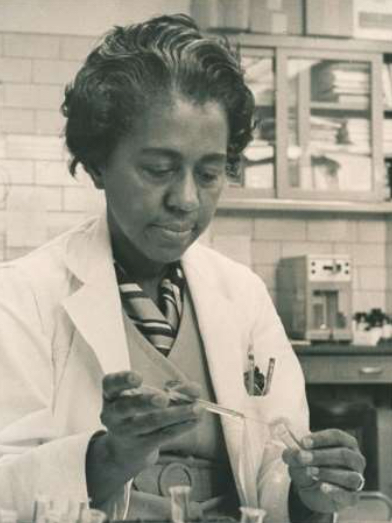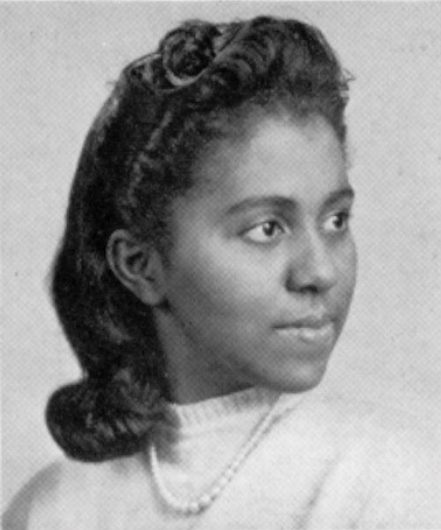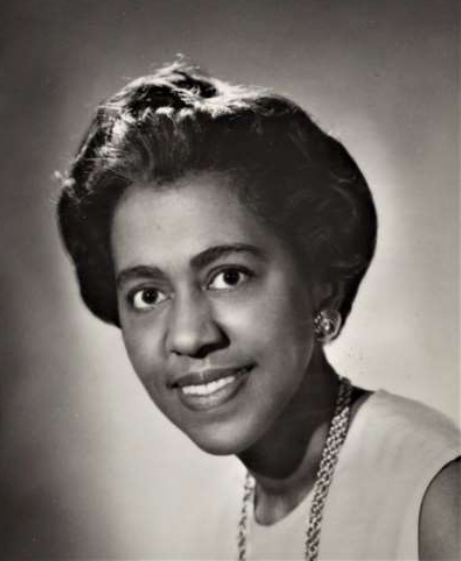Marie Maynard Daly
Marie Maynard Daly was born in Queens, New York in 1921.

Photo credit: Spartanburg Science Center, 2020
Dale Debakcsy, of Womenyoushouldknow.net, hails Marie Maynard Daly as “America’s First Black Woman Chemist”
(DeBakcsy, 2018). Indeed, working under Mary L. Caldwell, Daly studied at Columbia University and became the first African American woman to earn a doctorate in Chemistry (Science History Institute, 2018). With many men fighting in World War II, women in the 1940s were encouraged and incentivized to join formally male-dominated sectors in industrial and academic spaces. Consequently, Daly was granted full funding to pursue her doctorate which helped propel her scientific career (Diaz, 2007).
Prior to this, however, Daly’s family struggled to enter the realm of higher education. Daly’s father had been studying chemistry at Cornell University but was forced to drop out due to a lack of money.
Still, Daly’s father and mother promoted a strong love of books—especially books about science (Biography.com, 2021).

Photo credit: Science History Institute, 2018
While the financial difficulties persisted so, too, did Daly’s love of science and the field of chemistry. While living at home, she attended Queens College. After graduating with honors in 1942, she began working for Queens College as a part-time laboratory assistant and while simultaneously pursuing a master’s degree in chemistry at New York University (Science History Institute, 2018).
After receiving her doctorate, Daly provided critical strides into the research of health conditions and bodily chemicals. She “made important contributions in four areas of research: the chemistry of histones, protein synthesis, the relationships between cholesterol and hypertension, and creatine’s uptake by muscle cells” (The Rockefeller University, n.d.)

Photo credit: The Rockefeller University, n.d.
In 1948, after acquiring her own source of funding, Daly received the opportunity to serve in an apprenticeship with Dr. Alfred Ezra Mirsky. For seven years, the two researched the composition of the cell nucleus and the construction of proteins within cells in the body (Encyclopedia.com, 2021),(The Rockefeller University, n.d.).
In 1988, after retiring, Daly, in honor of her father, established a scholarship fund at Queens College for African American students studying science. Daly passed away in New York City in 2003. Her work is considered foundational to the understanding of cells, DNA, and the human body.
Works Cited
Biography.com. (2021, January 12). Marie M. Daly Biography. Retrieved from The Biography.com website: https://www.biography.com/scientist/marie-m-daly DeBakcsy, D. (2018, February 28). Marie Maynard Daly (1921-2003), America’s First Black Woman Chemist. Retrieved from Women You Should Know: https://womenyoushouldknow.net/marie-maynard-daly-first-black-woman-chemist/
Diaz, S. (2007, March 7). Marie Maynard Daly Clark (1921-2003). Retrieved from BlackPast: https://www.blackpast.org/african-american-history/clark-mariemaynard-daly-1921-2003/Encyclopedia.com. (2021, December 28).
Daly, Marie Maynard 1921–. Retrieved from Contemporary Black Biography: https://www.encyclopedia.com/education/newswires-white-papers-and-books/daly-marie-maynard-1921
Science History Institute. (2018, November 9). Marie Maynard Daly. Retrieved from Science History Institute: https://www.sciencehistory.org/historical-profile/mariemaynard-daly
Spartanburg Science Center. (2020, April 29). Dr. Marie Maynard Daly and the Human Heart. Retrieved from Spartanburg Science Center: https://www.spartanburgsciencecenter.org/2020/04/29/dr-marie-maynard-daly-and-the-human-heart/
The Rockefeller University. (n.d.). Daly, Marie M. Retrieved from Digital Commons @ RU: https://digitalcommons.rockefeller.edu/scientific-staff/10/
